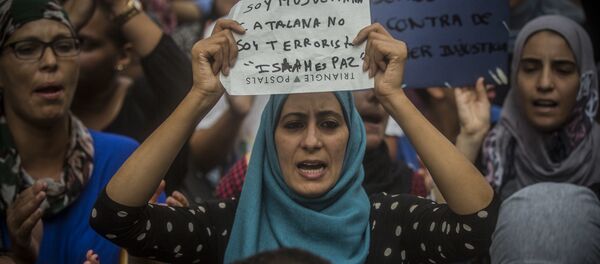Reports about a possible large-scale terrorist attack in Portugal continue to circulate in social networks, including Facebook.
In a bid to allay these concerns, Portuguese Prime Minister Antonio Costa referred to the latest intelligence reports, which he said revealed that it is unnecessary to change the current "moderate" terrorist threat level in his country.
"[Terrorism] is a global threat that can emerge everywhere. And, of course, our services should analyze and check all the information that appears," Costa said.
He said that "obviously, Portugal can become a target for terrorist attacks, especially because, as an EU and NATO member, the country remains within the [reach] of Islamic radical terror," Pereira said.
"Secondly, Portugal is [seen by terrorists as] part of their self-proclaimed caliphate and thirdly, Portugal may face a terror threat due to the reasons that are briefly described by the word 'globalization' which enables jihadists to stage a terrorist attack in the streets of Lisbon, Porto or Algarve against citizens of any country in the world," he added.
According to Pereira, the site of a terrorist attack is not that important because "television channels across the world will show this attack and its effect will extend far beyond the place in which it was conducted," Pereira pointed out.
At the same time, he admitted that the threat of a terrorist attack in Portugal is not as serious as it may be within Europe's larger countries.
"Experience shows that in Portugal there is not such a level of danger as in Spain, France or Britain, where communities with more radical Islamic elements are currently in place," Pereira said.
He recalled that "our communities [of migrants] are traditionally more peaceful" and that they are not leaning on terrorism. Even so, he warned that "this situation may change," first of all due to the fact that all those radical elements who left Portugal to join Daesh (ISIS) may return home.
"In the context of the fact that the self-proclaimed caliphate in Syria and Iraq is shrinking in size, many of these elements will return to their countries and may want to arrange terrorist attacks there. Although the number of Portuguese fighting in the Daesh ranks does not reportedly exceed a dozen and some may have perished, this danger always exists," Pereira said.
He added that "this peril increases due to the fact that we are in a zone of free movement which allows the perpetrator to quickly move to another country."
According to Pereira, the fact that Portuguese authorities did not raise the terrorist threat level does not mean that additional measures are not being taken.
"To move from a moderate to a considerable terrorist threat level, we need visible signs that a terrorist attack could be staged in Portugal. The invariability of the threat level does not indicate the authorities' reluctance to take anti-terror steps, such as those that have already been adopted in order to prevent a repeat of the attack, in line with the Barcelona scenario," he concluded.
According to Catalonia's police force, a 12-person cell was behind the slaughter. Four suspects have been arrested and five others were killed after the Cambrils attack.
Two more attackers allegedly died in an explosion in the Catalan town of Alcanar, where the terrorists had been preparing explosives. Last week, police confirmed they had killed Younes Abouyaaquob, the suspected perpetrator of the terrorist attack.






